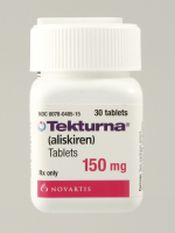Novartis ($NVS) may be looking at another trial of its troubled blood pressure drug Tekturna. This would not be a clinical trial, however, but more of the civil or criminal kind.
 As The Wall Street Journal reports, the Swiss drugmaker's annual report filing with the Securities and Exchange Commission this week included this tidbit. Last year it received a subpoena from the U.S. attorney for the Western District of Kentucky "requesting the production of documents relating to marketing practices, including remuneration of healthcare providers, in connection with certain NPC products (including Tekturna and its combination products)." The company said it is "cooperating with the investigation, which is civil and criminal in nature."
As The Wall Street Journal reports, the Swiss drugmaker's annual report filing with the Securities and Exchange Commission this week included this tidbit. Last year it received a subpoena from the U.S. attorney for the Western District of Kentucky "requesting the production of documents relating to marketing practices, including remuneration of healthcare providers, in connection with certain NPC products (including Tekturna and its combination products)." The company said it is "cooperating with the investigation, which is civil and criminal in nature."
In late 2011, Novartis halted a clinical trial of Tekturna on safety concerns. The company was testing Tekturna, also sold under the Rasilez brand, in diabetes patients with kidney problems. The hope was that Tekturna would protect the kidneys and heart from damage. But an increase in unwanted side effects--including nonfatal strokes and kidney complications--was seen in the Tekturna arm of the trial. Last year, Novartis added warnings to the drug's European label. Then in April, the FDA issued a warning against using the drug along with ACE inhibitors and angiotensin receptor blockers, both commonly used cardiovascular drugs, in patients with diabetes or kidney problems.
The upshot for Novartis was that the diminished outlook for the drug led it to take a $900 million charge last year and contributed to its decision to whack 2,000 jobs, most of them in sales. The pending patent loss at the time for its blockbuster Diovan also figured in there, of course.
In addition to that probe, Novartis filed a special Iran Notice with the SEC indicating that its Alcon eye care unit, which is based in Texas, is being investigated. The feds are looking at whether it violated sanctions against sales to Iran and other pariah nations. The company said a "grand-jury subpoena" asked for documents dating back to 2005. The company told the WSJ that it is cooperating but had nothing more to say.
Those were just a couple of bits of bad news the company laid on investors this week. After issuing its earnings report Wednesday, it told investors to expect flat revenue and slimmer profit this year as generics steal as much as $3.5 billion from 2013 sales.
- read the Wall Street Journal story (sub. req.)
- here's the SEC filing
- see the Novartis Iran Notice